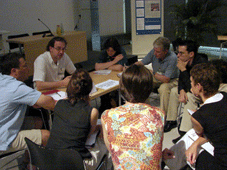When you’re putting in the effort to hold a participatory budgeting jury or any citizen jury, you want it to be the best jury possible. The role of the jurors is at the heart of this. Apart from pulling out all stops with catering, what considerations should guide the way you think about their role?
A few things to think about are clarity of purpose, influence and evidence.
Purpose: Providing a terms of reference document makes it clear what the purpose of the jury is, what’s expected from each juror, and what the sponsoring organisation agrees to provide.
Influence: each juror recruited will have an interest in the outcome of their work, especially given the time they have put aside and the effort they’ve put into understanding the issues and relationship building with other jurors. They will want to influence, that is to form recommendations that make sense and can be taken forward.
Evidence: participatory budgeting, along with other deliberative processes is an evidence-informed approach to policy influencing. We talk of jurors ‘weighing the evidence’, and of this process providing a rationality based on evidence and deliberation. Jurors want evidence in the form of strategies and plans, previous community consultations and other ‘desktop’ material. They also ask for witnesses, based on emerging questions and discussions. It’s important that there’s a balance of witnesses, to provide the jury with independent information.

